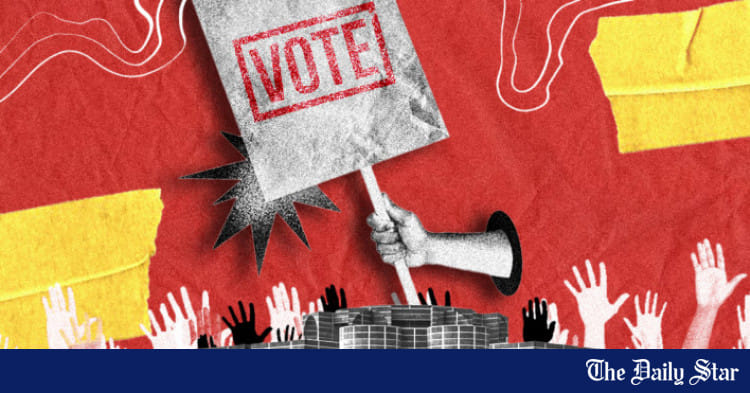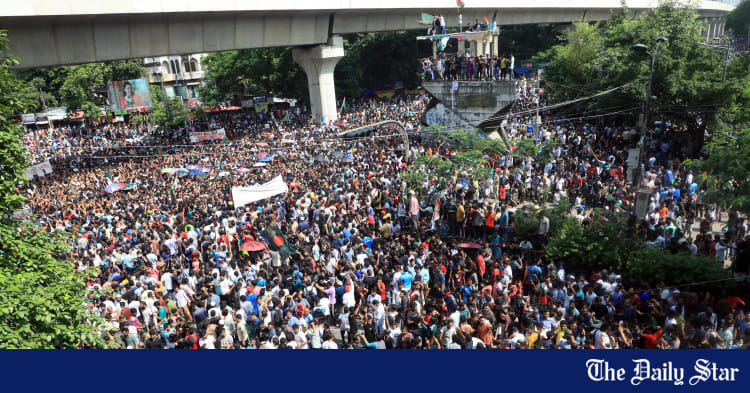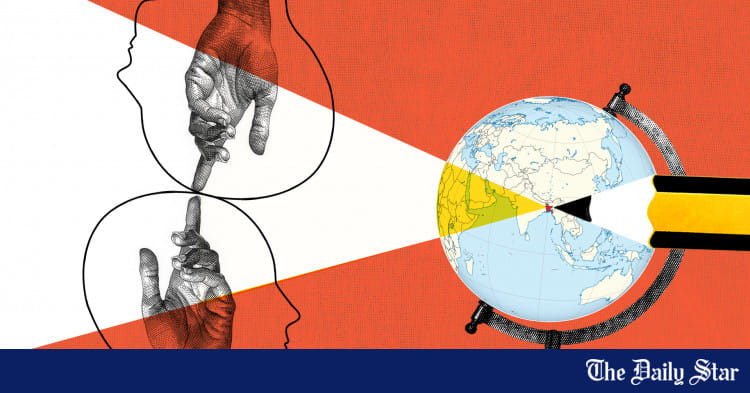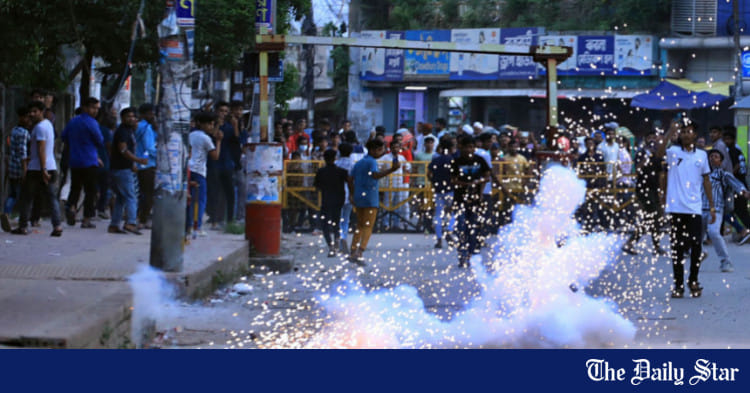Saif
Senior Member
- Messages
- 17,442
- Likes
- 8,381
- Nation

- Residence

- Axis Group


The urgent path out of Bangladesh’s current fragility
Having analysed the drivers of democratic transitions in the context of Bangladesh, on balance, we may still be on track to beat the odds.
The urgent path out of Bangladesh’s current fragility

FILE VISUAL: SALMAN SAKIB SHAHRYAR
The youth-led movement's victory in wresting freedom from an autocratic, kleptocratic government has provided us with the rare opportunity to once more rebuild our nation from scratch, to let go of all previous baggage and perforce political and geopolitical settlements on top of which Bangladesh had to be built. We have managed to raze all of that to the ground and before us lies a clean slate.
However, this is an urgent call to collectively be cognisant of the fact that our country right now is at an extremely critical stage. We are at this point, in essence, straddling a high, thin ledge, on one side of which lies the potential for a strong, sustained democratic Bangladesh and on the other side the spectre of crippled, failed nation.
Statistics, unfortunately, offer no solace either. In modern history, student-led movements against autocratic regimes have been one of the most studied phenomena in the realms of politics and political science. Here, statistics show that most countries fail to achieve that holy grail of a corruption-free, economically stable democracy, the vision of which generally fuels the movement towards its culmination of ousting an unpopular regime.
The post-movement results however fall anywhere along the spectrum of a country either descending into a failed state, reverting to some other form of autocracy, falling into military control, or managing to attain some success but by no means anywhere near the anticipated goal. Therefore, the aftermath of a successful movement is a political "Bermuda Triangle" so to speak—the potential to transition to democracy following many a successful uprising has disappeared exactly at this stage.
Post-movement, Bangladesh is at that fragile stage right now. If we want to beat the odds, and beat the statistics, we absolutely must draw lessons and do things differently. This begins with the urgent realisation that the key drivers of a successful mass uprising and those of a democratic transition post long-term autocracy are vastly different.
The necessary drivers of a democratic transition, following a successful movement include: firstly, a temporary governance arrangement that is non-partisan, socially legitimate with clear time limits and with predominant responsibility to establish an enabling environment for the conduct of free, fair elections; second, a set of functioning state institutions that would enable the conduct of democratic elections; third, existence of pro-democracy political parties with clear democracy mandates; and finally a regional environment that is supportive at the very least.
It is then important to analyse whether these drivers are present and if so, how do they manifest in case of Bangladesh? In case of their absence, what can be done as corrective action?
Taking the first driver, we have largely met that condition by establishing, in the immediate aftermath of an autocratic regime, a non-partisan, interim government that is socially acceptable to all stakeholders. Also fully understood is that the interim government will be working towards ensuring a democratic general election. However, a clear time limit and the overall terms of responsibility are yet to be set officially, which are essential elements of any temporary governance arrangement.
Nevertheless, concessions may be made for not being able to immediately set a time limit or terms of reference, as the interim government took reins at a time of deep national crisis. Almost all state institutions have been rendered completely dysfunctional through the infestation of the upper ranks with inept, corrupt, and partisan personnel.
This brings us to the second stated driver of having some key functioning institutions in place for the conduct of elections. It can therefore be argued that the reforms being undertaken by the interim government, which include the law enforcement agencies, judiciary, election commission etc., are required, at the very least, for democratic elections to be held.
Having said that, it will, however, be an astute move by the interim government to try and keep within a time frame of 120 days, as was stated in the erstwhile caretaker government provision. An interim arrangement, in juxtaposition to an active constitution of a parliamentary democracy, continuing for a longer period lays it open to several risks. These include the risk of being challenged on the legitimacy of reforms that cannot be directly linked to the formation of an enabling environment for general elections, the risk of being viewed as a form of power nab backed by the military (akin to the 2006-08 situation), consequently the risk of losing goodwill and support of international, pro-democracy allies; and perhaps most importantly, the risk of allowing our great "neighbour" time to re-insinuate itself once again and debilitatingly so, into our socio-political sphere.
Moving to the third driver, this requires the existence of pro-democracy political parties that in mandate and action engage to protect and uphold the principles of democracy. In functioning democracies, political parties tend to fulfil a vital intermediate role between citizens and the state, in which they represent citizens' interests and translate these into policy agenda. Now, in Bangladesh, most existing political parties will state that they are pro-democracy by "general intent," but by no means do they represent citizens' interests nor are they responsive to the needs. Instead, parties are engaged in struggle for power and access to state resources. In addition, 15 years of hostile rule by a single party have, to a great extent, left an impoverished political culture.
To ensure a sustainable democratic transition, we therefore need political parties that are explicitly pro-democracy, reinvigorated to embrace and represent the needs of the citizens, and eschew focusing on personal interests and patronage systems. Although there is no dearth of political parties in Bangladesh, extensive party reforms are necessary to have them surface into the modern era and serve as vehicles of representation. As such, one of the key tasks that the interim government should engage on, and this can relate directly to its primary mandate of electoral preparations, is to dialogue with political parties on required reforms, to be able to carry forward the kind of democracy we Bangladeshis are dreaming of.
The fourth and final driver, and perhaps the most significant one, is sadly one that is missing in case of Bangladesh: a regional environment that is supportive for a democratic transition. Through a combination of geography and an unrelenting, detrimental presence in our internal affairs, "regional" for us has unfortunately devolved into meaning only India. With Sheikh Hasina gone, perhaps for the first time in the history of Bangladesh, most serendipitously, India has been left with little or no "game" in this country, so to speak. However, we are indeed feeling the effects of this: the inexorable effort to try and establish the "invisible foreign hand" conspiracy theory, for instance, to not only undermine the agency of Bangladeshis to oust an autocracy but to also try and create a narrative for India to come (back) in to counter the "foreign hand."
Then there is misinformation vastly exaggerating the attack on minorities. Despite more and more reports to the contrary, India continues to overplay this in local and international media. These are all but a few post-Hasina shenanigans of our great neighbour. The situation has been aptly described by a well-known international publication which headlined, "India 'over-invested in Hasina and under-invested in Bangladesh' – and is now panicking"
If democratic elections are held timely, for the first time India might find itself in a position where it neither influences the ruling party nor the opposition. This is a highly undesirable state of things for India and something it would try its level best to remedy. Therefore, the longer we go without a democratically elected government, the more vulnerable we remain to overt and covert ploys being set in motion to regain a structure of influence in Bangladesh.
Having analysed the drivers of democratic transitions in the context of Bangladesh, on balance, we may still be on track to beat the odds. However, this will require us, both collectively and individually, to be aware of our current vulnerabilities and our fragility such that we can address these and make that transition to a democratic society, that so many before us have failed to achieve.
Mir Nadia Nivin is an international governance and institutional reform specialist having served previously with the UN in many countries around the world helping strengthen governance and implementing reforms.
FILE VISUAL: SALMAN SAKIB SHAHRYAR
The youth-led movement's victory in wresting freedom from an autocratic, kleptocratic government has provided us with the rare opportunity to once more rebuild our nation from scratch, to let go of all previous baggage and perforce political and geopolitical settlements on top of which Bangladesh had to be built. We have managed to raze all of that to the ground and before us lies a clean slate.
However, this is an urgent call to collectively be cognisant of the fact that our country right now is at an extremely critical stage. We are at this point, in essence, straddling a high, thin ledge, on one side of which lies the potential for a strong, sustained democratic Bangladesh and on the other side the spectre of crippled, failed nation.
Statistics, unfortunately, offer no solace either. In modern history, student-led movements against autocratic regimes have been one of the most studied phenomena in the realms of politics and political science. Here, statistics show that most countries fail to achieve that holy grail of a corruption-free, economically stable democracy, the vision of which generally fuels the movement towards its culmination of ousting an unpopular regime.
The post-movement results however fall anywhere along the spectrum of a country either descending into a failed state, reverting to some other form of autocracy, falling into military control, or managing to attain some success but by no means anywhere near the anticipated goal. Therefore, the aftermath of a successful movement is a political "Bermuda Triangle" so to speak—the potential to transition to democracy following many a successful uprising has disappeared exactly at this stage.
Post-movement, Bangladesh is at that fragile stage right now. If we want to beat the odds, and beat the statistics, we absolutely must draw lessons and do things differently. This begins with the urgent realisation that the key drivers of a successful mass uprising and those of a democratic transition post long-term autocracy are vastly different.
The necessary drivers of a democratic transition, following a successful movement include: firstly, a temporary governance arrangement that is non-partisan, socially legitimate with clear time limits and with predominant responsibility to establish an enabling environment for the conduct of free, fair elections; second, a set of functioning state institutions that would enable the conduct of democratic elections; third, existence of pro-democracy political parties with clear democracy mandates; and finally a regional environment that is supportive at the very least.
It is then important to analyse whether these drivers are present and if so, how do they manifest in case of Bangladesh? In case of their absence, what can be done as corrective action?
Taking the first driver, we have largely met that condition by establishing, in the immediate aftermath of an autocratic regime, a non-partisan, interim government that is socially acceptable to all stakeholders. Also fully understood is that the interim government will be working towards ensuring a democratic general election. However, a clear time limit and the overall terms of responsibility are yet to be set officially, which are essential elements of any temporary governance arrangement.
Nevertheless, concessions may be made for not being able to immediately set a time limit or terms of reference, as the interim government took reins at a time of deep national crisis. Almost all state institutions have been rendered completely dysfunctional through the infestation of the upper ranks with inept, corrupt, and partisan personnel.
This brings us to the second stated driver of having some key functioning institutions in place for the conduct of elections. It can therefore be argued that the reforms being undertaken by the interim government, which include the law enforcement agencies, judiciary, election commission etc., are required, at the very least, for democratic elections to be held.
Having said that, it will, however, be an astute move by the interim government to try and keep within a time frame of 120 days, as was stated in the erstwhile caretaker government provision. An interim arrangement, in juxtaposition to an active constitution of a parliamentary democracy, continuing for a longer period lays it open to several risks. These include the risk of being challenged on the legitimacy of reforms that cannot be directly linked to the formation of an enabling environment for general elections, the risk of being viewed as a form of power nab backed by the military (akin to the 2006-08 situation), consequently the risk of losing goodwill and support of international, pro-democracy allies; and perhaps most importantly, the risk of allowing our great "neighbour" time to re-insinuate itself once again and debilitatingly so, into our socio-political sphere.
Moving to the third driver, this requires the existence of pro-democracy political parties that in mandate and action engage to protect and uphold the principles of democracy. In functioning democracies, political parties tend to fulfil a vital intermediate role between citizens and the state, in which they represent citizens' interests and translate these into policy agenda. Now, in Bangladesh, most existing political parties will state that they are pro-democracy by "general intent," but by no means do they represent citizens' interests nor are they responsive to the needs. Instead, parties are engaged in struggle for power and access to state resources. In addition, 15 years of hostile rule by a single party have, to a great extent, left an impoverished political culture.
To ensure a sustainable democratic transition, we therefore need political parties that are explicitly pro-democracy, reinvigorated to embrace and represent the needs of the citizens, and eschew focusing on personal interests and patronage systems. Although there is no dearth of political parties in Bangladesh, extensive party reforms are necessary to have them surface into the modern era and serve as vehicles of representation. As such, one of the key tasks that the interim government should engage on, and this can relate directly to its primary mandate of electoral preparations, is to dialogue with political parties on required reforms, to be able to carry forward the kind of democracy we Bangladeshis are dreaming of.
The fourth and final driver, and perhaps the most significant one, is sadly one that is missing in case of Bangladesh: a regional environment that is supportive for a democratic transition. Through a combination of geography and an unrelenting, detrimental presence in our internal affairs, "regional" for us has unfortunately devolved into meaning only India. With Sheikh Hasina gone, perhaps for the first time in the history of Bangladesh, most serendipitously, India has been left with little or no "game" in this country, so to speak. However, we are indeed feeling the effects of this: the inexorable effort to try and establish the "invisible foreign hand" conspiracy theory, for instance, to not only undermine the agency of Bangladeshis to oust an autocracy but to also try and create a narrative for India to come (back) in to counter the "foreign hand."
Then there is misinformation vastly exaggerating the attack on minorities. Despite more and more reports to the contrary, India continues to overplay this in local and international media. These are all but a few post-Hasina shenanigans of our great neighbour. The situation has been aptly described by a well-known international publication which headlined, "India 'over-invested in Hasina and under-invested in Bangladesh' – and is now panicking"
If democratic elections are held timely, for the first time India might find itself in a position where it neither influences the ruling party nor the opposition. This is a highly undesirable state of things for India and something it would try its level best to remedy. Therefore, the longer we go without a democratically elected government, the more vulnerable we remain to overt and covert ploys being set in motion to regain a structure of influence in Bangladesh.
Having analysed the drivers of democratic transitions in the context of Bangladesh, on balance, we may still be on track to beat the odds. However, this will require us, both collectively and individually, to be aware of our current vulnerabilities and our fragility such that we can address these and make that transition to a democratic society, that so many before us have failed to achieve.
Mir Nadia Nivin is an international governance and institutional reform specialist having served previously with the UN in many countries around the world helping strengthen governance and implementing reforms.








